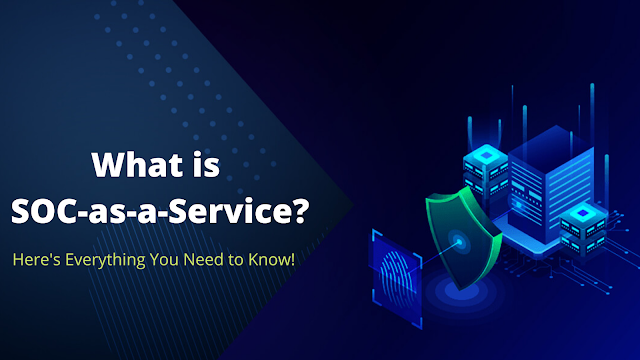The pace of technology evolvement is so high that it is becoming hard to stay up to date with the new complex terminology.
One such confusing term is SOC-as-a-Service, which is associated with SOC (Security Operation Center).
A Security Operation Center (SOC) is a hub or a center where the SOC analysts' team leverages tools to continuously monitors and mitigates an organization's security risks while preventing, detecting, analyzing, and responding to cybersecurity incidents and cyber-attacks throughout the organization.
SOC-as-a-service (SocaaS)
Outsourcing the continuous monitoring and response to an incident of an organization's security posture to a 3rd party vendors' dedicated SOC team is known as SOC-as-a-service or Managed SOC.The goal of SOC is to detect, analyze, and respond to cybersecurity incidents in a short period using a combination of technology solutions and a robust set of processes.
SOC-as-a-service allows organizations to stay ahead of attackers by continuously strengthening the security analysis of the log data (from data, transport, and network layer) and identifying and eliminating the detected breaches.
SOC-as-a-service vendors typically provide two SOC Service models, a Hybrid/Co-Managed and a Fully Managed SOC-as-a-Service service model.
- Fully Managed SOC-as-a-Service Model: Monthly subscription-based service where providers own, manage, and monitor 24/7/365 Turnkey SOC and SIEM products for your organization.
- Hybrid/Co-Managed SOC-as-a-Service Model: Customer owns the SIEM/Security Solution, and the service provider co-manages and monitors it 24x7 with our SOC.
Benefits of SOCaaS
1.Around-the-clock Protection:
Security operations center run 24/7 year-round. The uninterrupted monitoring and analysis for suspicious activity give an edge over the attackers.
2.Cost of Ownership:
With SOCaaS, companies do not have to worry about the cost of equipment, licenses, and payroll of the security staff. It further helps to lower the operational expenditure. Typically, there are no hidden costs in the contracts. Organizations pay a set amount each month for continuous protection. Moreover, SOC analysts work actively to minimize the effect of cyber-attack, thus preventing businesses from the burden of bearing the cost and lawsuits resulting from breaches.
3.Centralized Threat Analysis:
There is no delayed response to the reported threat with a centralized cyber-security strategy.
4.Skilled Resources:
A standard SOC team comprises cyber-security experts with diverse skill sets and broad knowledge of tried-and-true technologies for threat detection and prevention, such as SIEM, AI, Machine Learning, and Cloud Access Security, as well as the most advanced Threat Detection Techniques.
5.Compliance Management:
Key SOC monitoring must act as per regulations such as GDPR, HIPAA, and PCI DSS. It not only helps safeguard the sensitive data, allows meeting compliance audit checks, but it can also shield the organization from reputational damage and legal challenges resulting from a breach.
6.Latest Technology:
A managed SOC provider takes all the necessary measures to keep its toolset up-to-date and provides the benefits of state-of-the-art security to its customers.
Essential Considerations for selecting the right SOC-as-a-Service Provider
1.Toolset:
what SIEM tools does the SOC know and integrates? Likely the SOC is imposing a set of tools. A SOC as a service provider should be able to provide you complete solution as per your need. The provider should not be biased towards the technology stack.
2.Onboarding:
The onboarding process is longer than necessary. A well-oiled and mature onboarding process should be able to onboard a typical customer with an average of 1000 assets in less than two weeks.
3.SOC Log Ingestion Topologies:
How much flexibility SOC provider allows in configuring the devices/endpoints/etc. to collect log data
4.Coverage:
What doesn't fit into the SOCs coverage? What can't be effectively secured?
5.Documentation and Process Maturity:
Slow functioning of SOC due to lack of documented processes and procedures.
6.Use Cases:
SOC providers should give more importance to use cases than just the technology platform. There should not be a limit on the number of Use-Cases in scope for a project.
7.Incident Handling:
Time-To-Respond is yet another critical measurement of the quality of any SOC. Look for the SLA's defining the average time a SOC team takes to detect and responds to an attack, neutralizes it, and help customers recover from it.
8.Noise Reduction:
How is the SOC provider reducing the sheer volume of noise to actionable intel and alerting.
9.People/staff:
Staff needs external training and knowledge. A fully functioning SOC requires people with a range of specialist skills, from the network and forensic analysts to threat intelligence researchers.
10.Communication:
Accessibility to providers' managed SOC team also plays an important role.
11.Reporting:
IT is plagued with the problem that when it works well, it's invisible. What level of reporting does the SOCaaS provider provides for the end clients to SHOW that they are working hard? What PROOF is there that someone is on the other end of the data collection is actively monitoring and protecting the clients 24/7. Is SOC providing custom reports?
12.Compliance:
Is the provider compliant with SOW terms and data security?
Why SafeAeon 24x7 SOC-as-a-Service Provider?
- 24x7/365 days SOC coverage via in-house SOC experts.
- Service built primarily to cater to the needs of the MSP market. Customized packages to cater to the need of an MSP partner.
- Monthly contracts (No lock-in contracts).
- No service cancellation penalty.
- Industry-leading quality at industry-beating prices to allow MSP partners to up-mark our service and still stay competitive and win business.
- Dedicated 1-800 number and SOC Delivery Manager.
- GOLD 30-Minute SLA for Critical security alerts
- Unlimited Use Cases, Reports, Log Source & Rule Adds
- Provide Sales/Marketing enablement and Sales cycle engineering support.










No comments:
Post a Comment